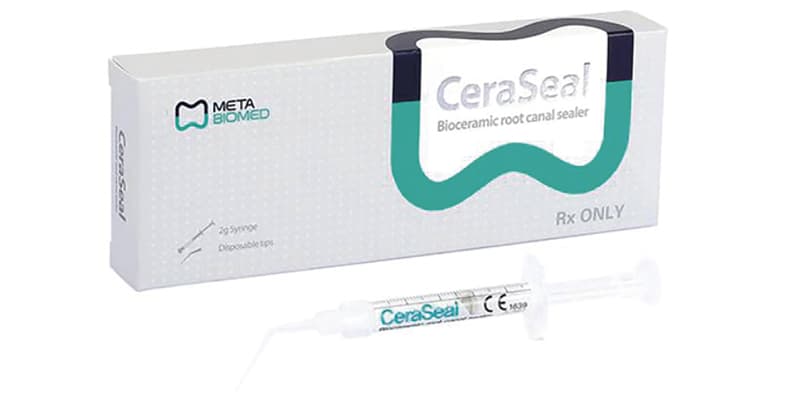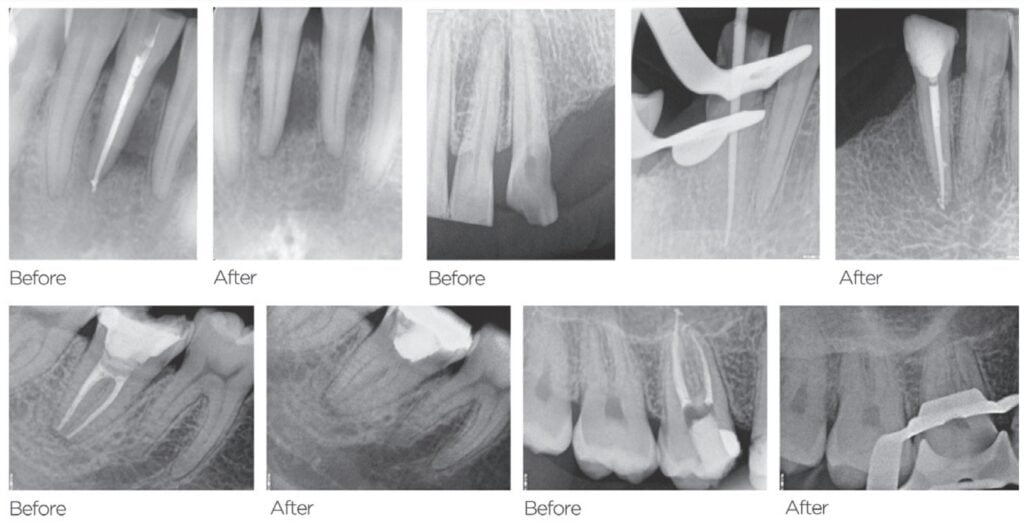CeraSeal, a calcium silicate-based bioceramic root canal sealer from Meta Biomed provides an optimal biocompatible environment to tissues in the root canal. Read more about its benefits here.
 CeraSeal from Meta Biomed provides antimicrobial properties, high biocompatibility, and a hermetic seal
CeraSeal from Meta Biomed provides antimicrobial properties, high biocompatibility, and a hermetic seal
Successful root canal treatment means the complete elimination of microbial entity and prevention of future predilection of reinfection. Achieving that objective requires a proper seal, thereby diminishing the chance of bacteria proliferation and future occurrence of pathology. However, with so many different categories and brands of sealer available, it can be difficult to determine the best choice for effective treatment.
Let’s consider the key properties of root canal sealer. The material must close the space around the gutta percha and extend to the dentinal wall, forming a bond between the core of the filling material and the root canal wall. The root canal sealer must fill in potential gaps and voids, and flow into and seal off lateral and accessory canals.

While Grossman described 11 properties of root canal sealer — including providing good adhesion, a hermetic seal, radiopacity, and nonshrinkage — it’s been widely accepted that there may be no perfect sealer that accomplishes all criteria. Clinicians have had to choose among types of sealer categorized according to their main chemical constituents: zinc oxide eugenol, calcium hydroxide, glass ionomer, silicone, resin, and bioceramic-based sealers.
Introduced to endodontics in the 1990s and advancing to newer generations, bioceramic sealers have several major advantages. Importantly, their biocompatibility prevents rejection by the surrounding tissues, and they contain calcium phosphate, which enhances the setting properties of bioceramics and results in a chemical composition and crystalline structure similar to tooth and bone apatite materials, thereby improving sealer-to-root dentin bonding.
Optimal biocompatibility
CeraSeal, a calcium silicate-based bioceramic root canal sealer from Meta Biomed, represents the next generation, providing high flowability and excellent sealing ability while creating an optimal biocompatible environment to tissues in the root canal.
The calcium silicate produces calcium aluminate hydrate (CAH) gel and calcium silicate hydrate (CSH) gel by absorbing the moisture from surrounding tissues in the root canal and some crystallization of calcium hydroxide. Thanks to the high pH of calcium hydroxide, the material has an antimicrobial action that suppresses the bacteria in the root canal.
Stronger seal and faster set
Moisture in the dentinal tubules and calcium silicate’s chemical reaction produce crystallization of calcium hydroxide. As a result of this reaction, CeraSeal is fully hermetic in the root canal and prevents the propagation of bacteria. And while sealers such as those that are resin-based will shrink upon setting, CeraSeal neither shrinks in the root canal nor expands. Therefore, CeraSeal not only prevents bacteria, but also protects against odontoclasis because of the high-volumetric stability. The hermetic sealing also allows for single-cone technique obturation.
Radiopacity is a key property of root canal sealers, so they can be distinguishable from adjacent anatomical structures. CeraSeal’s high radiopacity of 8 mm allows the quality of the root filling to be sufficiently evaluated through radiographic examination.
Another benefit of CeraSeal is its short setting time (3.5 hours). This prevents the washout phenomenon. And while the science behind CeraSeal makes it a viable option for permanent root canal sealing and permanent root canal filling, there is one more benefit for the clinicians — it’s easy to use. CeraSeal comes in a premixed syringe with no mixing required.
This information was provided by Meta Biomed.
Read about treatment for a patient with challenging anatomy, using a new file system and CeraSeal. https://endopracticeus.com/endodontic-management-of-challenging-anatomy-with-a-new-file-system-about-a-retreatment-in-upper-first-premolar-type-vi-vertucci/
Stay Relevant With Endodontic Practice US
Join our email list for CE courses and webinars, articles and more..

